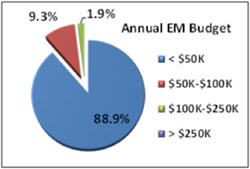VERONA, NJ – In a survey conducted by LiveProcess in conjunction with the American Hospital Association, emergency managers at hospital across the U.S. were queried about issues they face within their own programs, and the results paint a grim picture for preparedness across the country -- even with extensive Hospital Preparedness Program (HPP) funding.
“The federal grant programs have been a great way to help healthcare organizations integrate with the broader community response,” said Mitch Saruwatari, vice president of quality and compliance for LiveProcess, a provider of healthcare emergency management software, in a recent blog post on http://blog.liveprocess.com. “However, preparedness begins at the facility level and staff must know their assigned response roles and have adequate training to perform them during a disaster. To accomplish this, hospitals will need to consider allocating increases in budget and resources.”
One of the critical areas assessed by the survey was whether emergency managers had concerns about staff knowing their assigned roles and have adequate training to perform them when the emergency operations plan is activated. Nearly half of those responding considered this a significant challenge.
Within the same survey, emergency managers were queried about annual emergency management  budgets provided by the hospital. In nearly 90 percent of those surveyed, these budgets were less than $50,000 per year (see chart at right).
budgets provided by the hospital. In nearly 90 percent of those surveyed, these budgets were less than $50,000 per year (see chart at right).
In addition, very few organizations employed a full-time emergency management professional, so even with budget, finding the necessary time to manage training programs would be difficult, at best.
One striking contradiction in the survey results was that more than two thirds of the respondents reported their organizational leadership supporting exercises and training. However, results show that these same healthcare organizations are not putting resources such as staff time and funding toward exercises and training.
Events such as the September 11 attacks and Hurricane Katrina demonstrated that hospitals may not be completely self-sufficient and able to support the community when disasters occur. Subsequently, federal grant initiatives such as the HPP were created to help bridge the gap between facility and community healthcare preparedness.
“One of the best outcomes of HPP has been the development of the regional healthcare coalition, which brings public and private organizations into a non-competitive forum to collaboratively address how a community will prepare and respond to medical-related events,” noted Saruwatari.
In a five-year evaluation of the HPP program conducted by The Center for Biosecurity of UPMC, these regional healthcare coalitions wereentified as one of the most significant factors contributing to strengthened healthcare preparedness.
“It’s unfortunate that there may still be gaps at the individual facility level,” said Saruwatari. “For example, while the majority of our respondents believed the community response would support them, less than half were confident their own facility would respond effectively to an incident. That has to change.”
About LiveProcess LiveProcess is the market leader in web-based emergency preparedness and incident management for healthcare. The patented LiveProcess platform provides hospitals, other healthcare providers and public health agencies with the ability to evaluate and manage their own preparedness and state of readiness, and coordinate their response to small incidents through large-scale healthcare emergencies. LiveProcess was recently named to Inc. Magazine’s list of America’s fastest-growing private companies with a three-year growth rate of 620 percent. For more information, visit www.liveprocess.com.
For more information, contact: Rachel Hedstrom Phone: 972-365-7741 Email: Rachel@thegentryagency.com
